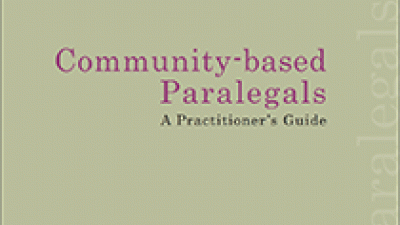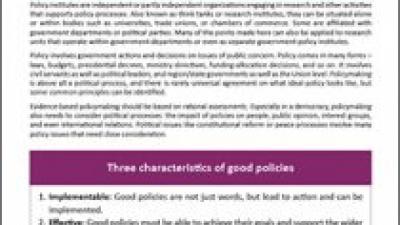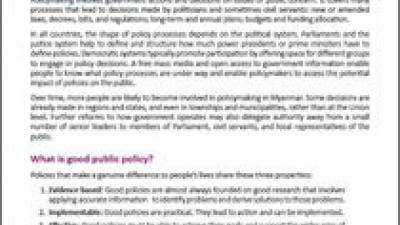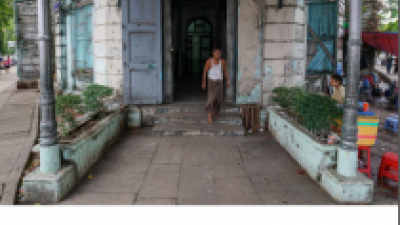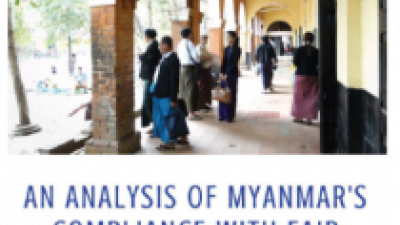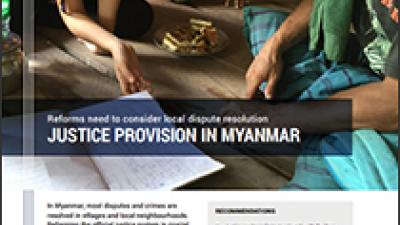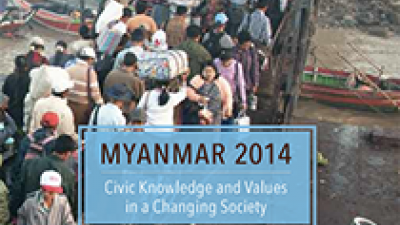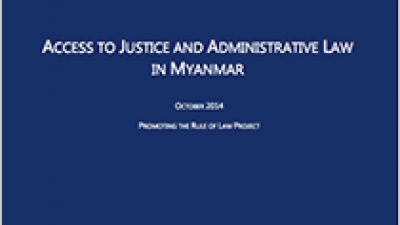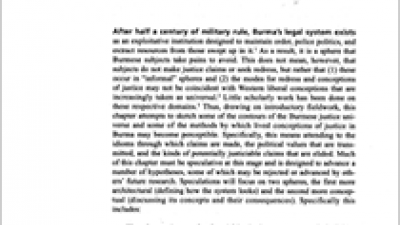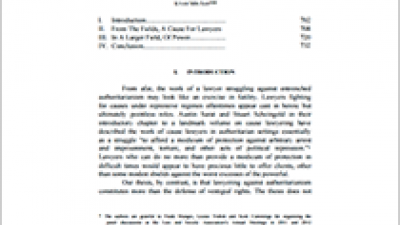-
This guide is an excellent hands-on resource for starting or improving a paralegal program. It includes case studies from Cambodia, the Philippines, and around the world and is available in English...
Namati Community-Based Paralegals: A Practitioner’s Guide
This guide is an excellent hands-on resource for starting or improving a paralegal program. It includes case studies from Cambodia, the Philippines, and around the world and is available in English and Myanmar. For more information, see Namati’s comprehensive web-based guide and their Myanmar Facebook page.
-
This short February 2016 guide from The Asia Foundation considers how policy institutes can effectively support the policy making process in Myanmar. It suggests that as policy institutes grow and...
Strengthening Policy Institutes in Myanmar
This short February 2016 guide from The Asia Foundation considers how policy institutes can effectively support the policy making process in Myanmar. It suggests that as policy institutes grow and strengthen, they can assist political leaders by providing better data and analysis to improve how policies are formulated.
-
This February 2016 guide from The Asia Foundation explains what public policy is, what components go into good public policy, and how the Myanmar government can strengthen policy formulation.
-
Behind Closed Doors: Obstacles and Opportunities for Public Access to Myanmar’s Courts
This June 2017 report from Justice Base details observers’ findings from 205 criminal and civil hearings in 36 of Yangon’s 50 courts. The report concludes that increasing public access to courts is a necessary condition for restoring public trust and a key to broader judicial system reform.
-
This October 2017 report from Justice Base details observers’ findings from Yangon Region’s Township and District Courts from 12 June 2013 to 30 April 2014 and 11 January 2015 to 28 December 2016.
-
This March 2017 policy brief shares findings from recent research by the EverJust project, which is a collaboration between EMReF, Yangon University, the Danish Institute for International Studies,...
DIIS Policy Brief: Justice Provision in Myanmar
This March 2017 policy brief shares findings from recent research by the EverJust project, which is a collaboration between EMReF, Yangon University, the Danish Institute for International Studies, and Aarhus University.
-
This 2014 survey report by The Asia Foundation (TAF) provides a broad sense of public knowledge and opinion across Myanmar from over 3,000 participants in all 14 States and Regions. The survey covers...
The Asia Foundation Civic Knowledge and Values in a Changing Society
This 2014 survey report by The Asia Foundation (TAF) provides a broad sense of public knowledge and opinion across Myanmar from over 3,000 participants in all 14 States and Regions. The survey covers topics like knowledge of government, political participation and understanding, identity, gender, the peace process, public outlook, and sources of information.
-
This October 2014 paper by Melissa Crouch (sponsored by the Promoting Rule of Law Project) examines the importance of administrative law in Myanmar in promoting good governance, accountability, and...
Access to Justice and Administrative Law in Myanmar
This October 2014 paper by Melissa Crouch (sponsored by the Promoting Rule of Law Project) examines the importance of administrative law in Myanmar in promoting good governance, accountability, and checks on executive power.
-
This article by Elliott Prasse-Freeman in Myanmar: The Dynamics of an Evolving Polity (2015) draws on interviews with lawyers and legal aid professionals in Yangon to map the informal mechanisms...
Conceptions of Justice and Rule of Law in Burma
This article by Elliott Prasse-Freeman in Myanmar: The Dynamics of an Evolving Polity (2015) draws on interviews with lawyers and legal aid professionals in Yangon to map the informal mechanisms through which Myanmar people seek out their versions of justice.
-
This 2014 article published in the Wisconsin International Law Journal argues that Myanmar lawyers should take up advocacy for the law itself as a cause and a long-term, systemically oriented view of...
Not Just Defending; Advocating for Law in Myanmar (Nick Cheesman and Kyaw Min San)
This 2014 article published in the Wisconsin International Law Journal argues that Myanmar lawyers should take up advocacy for the law itself as a cause and a long-term, systemically oriented view of their efforts as activists.
